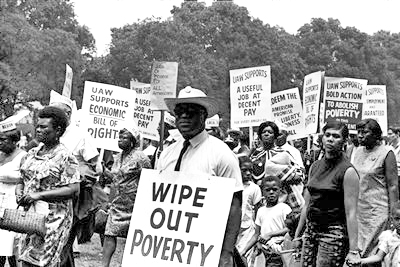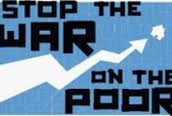When I started my graduate studies in the late 1980s I taught freshman composition to entering undergraduates. As an undergraduate myself in the early 1970s and as a child of the 1960s (not just the 1960s in general, but the 1960s of post-Independence India in particular), I had had my core values instilled in me much earlier. At first it shocked and unnerved me to see how dramatically different their basic assumptions were from mine, until it dawned on me that, as children of the 1980s, these 18 year-olds had come to consciousness during the Reagan era.
My realization of this difference in perspective came when we were discussing an essay on poverty in the United States. In my childhood, the poor were the products of structural inequities in society, their children having grown up without proper housing, healthcare, or nutrition and without the educational and employment opportunities of the more privileged classes. The dominant view then was that social programs existed as a safety net for those who were struggling and to redress the imbalance in society. The poor were to be given a helping hand: not charity, but a fair shake. Furthermore, the rich were indebted to the poor, since it was their hard labor that had afforded the wealthy their lives of ease. That’s more-or-less how we saw it. We further believed that acquisitiveness was not a virtue: the wealthy at least ought to invest their surplus wealth in the national economy, rather than squandering it in conspicuous consumption.
 My students, however, thought that the rich deserved their wealth and had every right to the most lavish of lifestyles. Their disapproval was reserved for the “undeserving poor“, whose condition they ascribed to laziness and lack of ambition. If they wanted money, then they ought to work for it like the rest of us. This was the prevailing attitude among my students: if these people were poor, it was their own fault.This was the legacy that Reaganomics bequeathed to them and to subsequent generations.
My students, however, thought that the rich deserved their wealth and had every right to the most lavish of lifestyles. Their disapproval was reserved for the “undeserving poor“, whose condition they ascribed to laziness and lack of ambition. If they wanted money, then they ought to work for it like the rest of us. This was the prevailing attitude among my students: if these people were poor, it was their own fault.This was the legacy that Reaganomics bequeathed to them and to subsequent generations.
I ought not to have been surprised. This attitude was set forth as common sense in the marketing of Reagan’s domestic policy and has taken root so successfully as the national ethos that all subsequent U.S. administrations have adopted it to some degree. While Ronald Reagan was fond of repeating a story of a “welfare queen” who drove a Cadillac (a myth that maligned black people as well as justifying the slashing of social programs for the poor) it was Bill Clinton on whose watch “welfare reform” cut off single mothers’ welfare payments after a certain period of time and forced them to return to work on sub-poverty salaries, often having to leave their children unsupervised. Blame the Poor was again the watchword: if these immoral and irresponsible women had gotten themselves pregnant out of wedlock, what right did they have to expect society to pay for raising their children while they lay abed all day taking drugs and living lives of gay abandon?
 Just as hypnopaedia imprinted the babies of Aldous Huxley’s Brave New World with the ideology of their society, so Reaganomics 101 was imbibed by the children of the 1980s all unawares.
Just as hypnopaedia imprinted the babies of Aldous Huxley’s Brave New World with the ideology of their society, so Reaganomics 101 was imbibed by the children of the 1980s all unawares.
There’s plenty of work; they just don’t want to do it.
They just want a government handout.
Why should we subsidize their sloth?
I’m so glad I’m an investment banker.
I guess I was out of step with the times; as Reagan was taking the oath of office, pledging to get Big Government off the backs of hardworking Americans, our newly-formed letterpress print shop joined the IWW (the Wobblies), whose Little Red Songbook featured the feisty Dump the Bosses off Your Back.

 Although the Wobblies shamelessly secularized the beloved Christian hymn, What a Friend We Have in Jesus, I’d dare bet that the IWW’s declaration in the Preamble to their constitution that “there can be no peace so long as hunger and want are found among millions of the working people and the few, who make up the employing class, have all the good things of life”, is closer to Jesus’s teaching in Matthew 19:24 than is Reaganomics 101, a doctrine that taught my innocent students to honor the rich and to blame, rather than bless, the poor.
Although the Wobblies shamelessly secularized the beloved Christian hymn, What a Friend We Have in Jesus, I’d dare bet that the IWW’s declaration in the Preamble to their constitution that “there can be no peace so long as hunger and want are found among millions of the working people and the few, who make up the employing class, have all the good things of life”, is closer to Jesus’s teaching in Matthew 19:24 than is Reaganomics 101, a doctrine that taught my innocent students to honor the rich and to blame, rather than bless, the poor.



